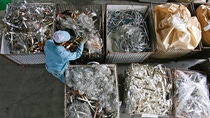Chi siamo
Municipal recycling concepts

In 2009, each citizen of the European Union (E.U.) produced an average of 510 kilograms of household waste. However, in the United States this figure was even higher, with every citizen producing 720 kilograms on average. Given the growing mountains of trash, many municipalities have to come up with solutions for how to deal with household waste.
Several E.U. member states have introduced waste separation systems since the 1990s, becoming role models for municipalities around the world. A number of E.U. directives have also led to increasing recycling rates across Europe, although statistics still vary widely between countries.
A European model of how to deal with household trash is found in Amsterdam, the Netherlands. The city burns 99% of its household and industrial waste and uses the energy produced to generate electricity for the local public transport system, street lights and for 75% of all households. In addition, the residual heat from incineration is used to provide heat for 12,000 households. Metals like iron, copper and aluminium are collected and sold, while the rest of the waste is used as construction materials for roads.
“In 2009, each citizen of the United States produced an average of 720 kilograms of household waste.”
Communities in emerging markets often cannot afford this kind of investment in recycling technology, but some have come up with innovations of their own. The Brazilian city of Curitiba, for example, introduced a revolutionary waste disposal program in 1991. Because garbage trucks were not able to access the small lanes of local favelas, the city started a barter program: garbage for food. Every two weeks at 61 designated places in the city, locals can exchange four kilograms of recyclable materials for one kilogram of food. Depending on the season, citizens are also able to swap their garbage for school materials or plants.
In the United States, San Francisco leads the way in terms of recycling. In 2009, the mayor started a waste separation system similar to those found in Europe. Now, only 22% of household waste ends up in the landfill – one of the lowest rates in the country. The city plans to recover all its household waste by 2020.




